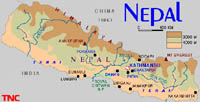Civilian casualties soaring again in Nepal
Civilian casualties have soared again in Nepal this year following a drastic reduction during the last four months of 2005 when the country's communist rebels observed a unilateral cease-fire, a rights group said Tuesday. New York-based Human Rights Watch said the United Nations and countries such as India , the U.S. , Britain and China should step up pressure on both sides to observe the laws of war and international human rights standards.

Since ending their cease-fire on Jan. 2, the guerrillas have intensified attacks on government targets and troops. "Civilian casualties, which decreased significantly during the cease-fire, quickly returned to previous levels once fighting resumed," New York-based Human Rights Watch said in a statement.
It did not give a comparative estimate of the number of casualties. But the group blamed both sides for the casualties, citing indiscriminate aerial bombardment by the army of civilian areas, and use by the rebels of houses, schools, and public spaces.
It said representatives of Human Rights Watch had spent three weeks studying the situation in several parts of Nepal , including areas affected by rebel violence. The rebels said they abandoned their unilateral cease-fire because the government had failed to reciprocate or make attempts to resolve the conflict peacefully.
The rebels, who say they are inspired by Chinese revolutionary Mao Zedong, have fought for a decade to establish a communist government in Nepal . The insurgency has claimed nearly 13,000 lives. King Gyanendra seized control of the government last year, saying he needed to take power to crush the rebels. The guerrillas want to replace the monarchy with a communist state.
Human Rights Watch said the fighting between the rebels and government troops has engulfed the country, affecting nearly every one of Nepal 's 75 provinces. "Renewed fighting has brought renewed abuses," said Sam Zarifi of the group. "The failure of both sides to ensure the safety of civilians has left too many Nepalis living in fear that the conflict is going to burst through their doors." On Monday, four army helicopters bombed an area in north central Nepal where the rebels were to hold a rally. The spot was just outside a high school, reports the AP.
N.U.
Subscribe to Pravda.Ru Telegram channel, Facebook, RSS!




